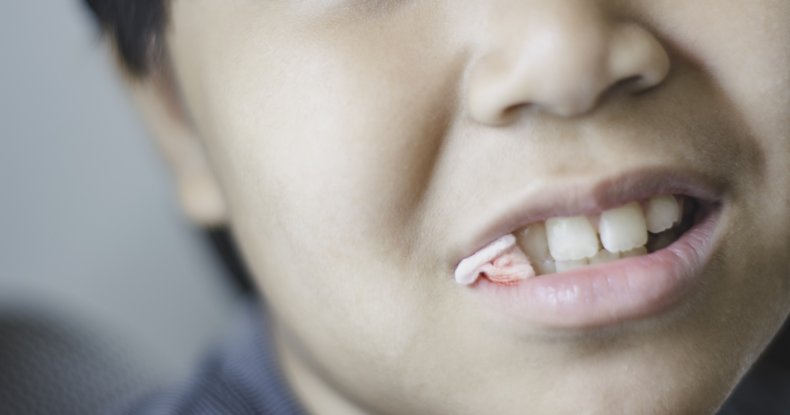
The day after surgery you should begin rinsing gently at least five to six times a day with a cup of warm water mixed with a 1/2 teaspoon of salt, especially after eating. You can brush your other teeth the night of surgery but rinse/spit only very, very gently. Avoid brushing the surgical sites for one week. No rinsing of any kind should be performed until the day following surgery. You will feel better, have more strength, less discomfort, and heal faster if you continue to eat. At least five to six glasses of liquid should be taken daily. You should prevent dehydration by taking fluids regularly. Your food intake may be limited for the first few days, but try to maintain a normal intake. Difficulty opening your mouth widely for several days is normal. You may experience some difficulty swallowing in the first few hours because of the freezing, and for the next several days due to the discomfort. potato chips, raw vegetables) until healing seems complete, or be very careful to avoid the surgical sites.

Try to avoid tough or crunchy foods (e.g. High calorie, high protein intake is very important. Because of the ëfreezingí it may be difficult to judge temperature for the first few days, so be careful with hot food/liquid.

Following this, you should eat soft foods (pudding, yogurt, soups, pasta, well-cooked veggies) by chewing away from the surgical sites. Do not use straws, as the sucking motion can cause more bleeding by dislodging the blood clot. You should rest quietly for 24 hours following surgery and avoid vigorous exercise and heavy lifting for at least 3-5 days.ĭrink liquids only after general anaesthesia or IV sedation for several hours. For these reasons, you could get light headed when you stand up, so before standing you should sit for a minute first. Taking pain medications can also make you dizzy. You may not have been able to eat or drink prior to surgery, and it may be difficult to take fluids for a short period immediately following surgery. You should be careful going from the lying down position to standing. YOU MUST HAVE SOMEONE WITH YOU AT HOME FOR AT LEAST 24 HOURS. It is important that you do not drive a motor vehicle, sign any documents of legal importance, operate any power tools, or do any high-risk activity for 24 hours after surgery. Although you may soon feel awake and alert, the sedative drugs are still in your system for a period of time. sedation or general anaesthetic for your surgery, you may not remember much about the procedure. If your pain is not tolerable, or seems to be worsening beyond the first three days, please call the office.Īfter I.V. The discomfort will probably last at least several days, possibly even 1 or 2 weeks depending on the surgical difficulty and your individual response. Tylenol #3), be sure not to take them together or you may exceed the allowable dose. If your prescription medication contains any of these substances (e.g. If not prescribed, and you were not warned by your surgeon or family physician otherwise, you may also use ibuprofen (Motrinô, Advilô) or acetaminophen (Tylenolô) as per the instructions on the bottle. Also keep in mind that your medications may not completely eliminate pain, but should make it manageable. You may notice an increase over 2 to 3 days after the procedure, and this is usually normal. The amount of pain you will have will vary. Take the recommended or prescribed pain medication as directed to relieve symptoms. You will likely feel some discomfort after the anaesthetic (ëfreezingí) wears off. Restrict your activities the day of surgery and resume normal activity when you feel comfortable. After this time, the gauze pad should be removed and discarded.

The gauze pad placed over the surgical area should be kept in place for a half hour if not removed by our office prior to leaving. Unnecessary pain, bleeding, swelling and other complications can be minimized if these instructions are reviewed and followed carefully.

The removal of impacted teeth is a serious surgical procedure.


 0 kommentar(er)
0 kommentar(er)
